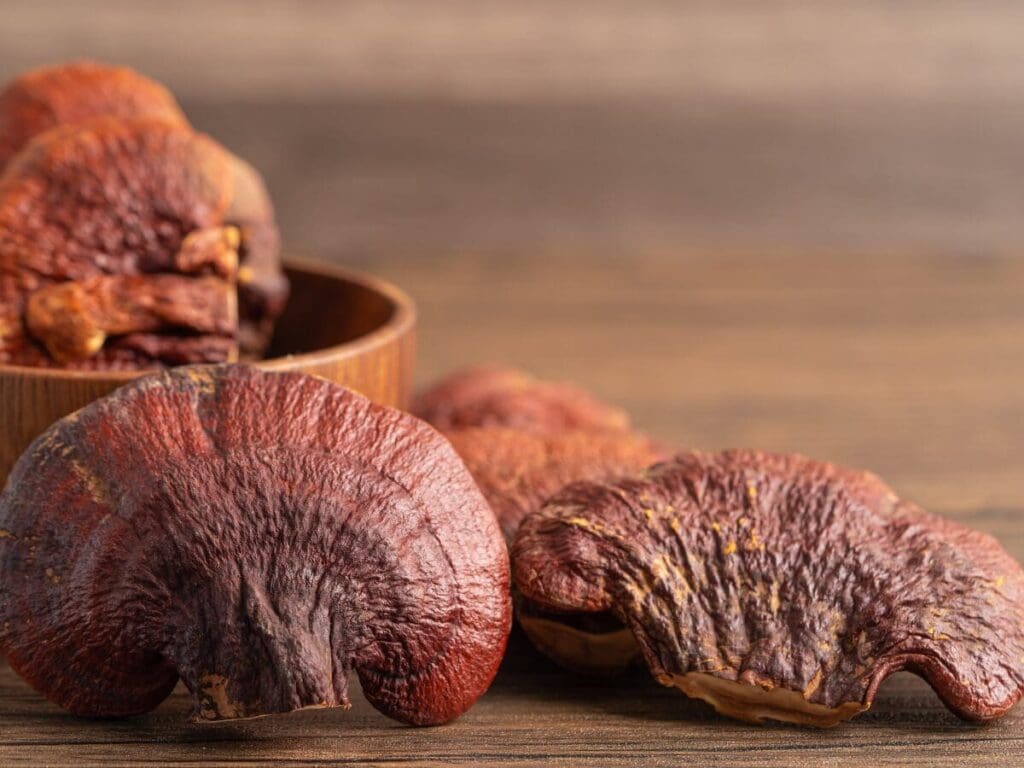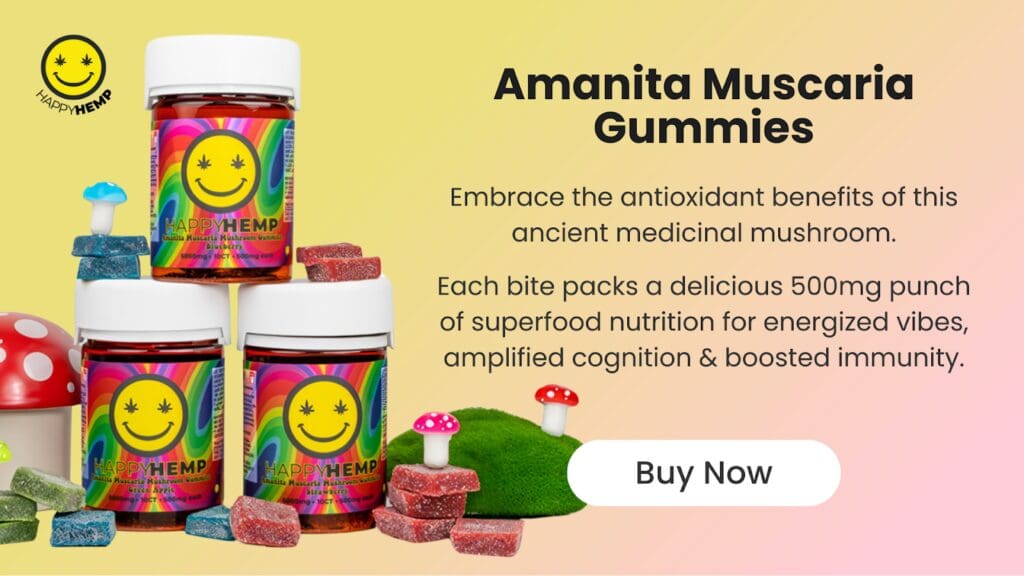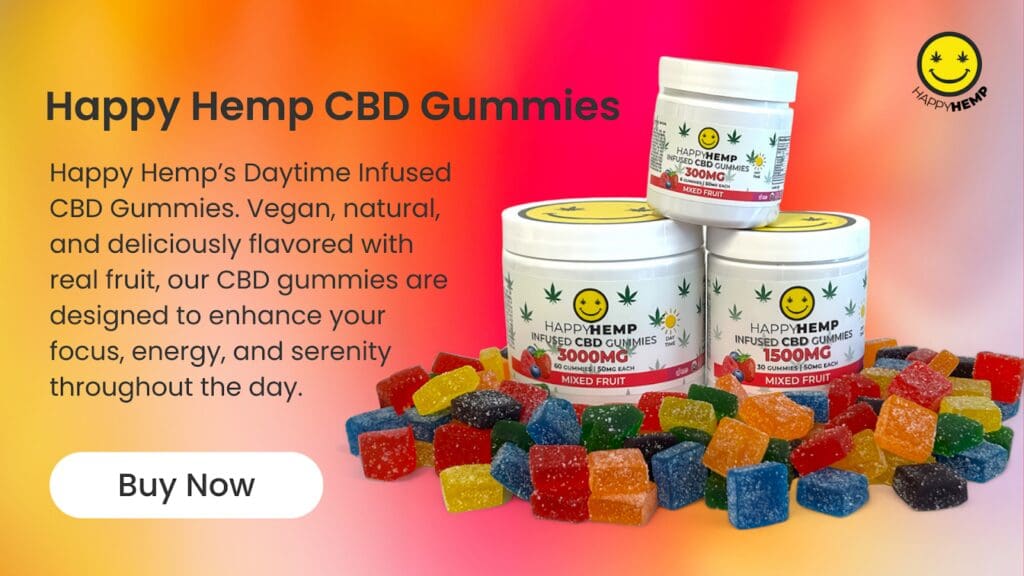Key Takeaways:
- Natural Support for Mind and Mood: Mushrooms can help reduce stress and support emotional balance naturally.
- Cognitive Boosters: Certain mushrooms, like Lion’s Mane, aid in cognitive health, enhancing memory and focus.
- Convenient Mushroom Options: Happy Hemp’s gummies offer a tasty, easy way to incorporate mushrooms into daily wellness routines.
Are you feeling overwhelmed by daily stress or looking for a natural way to support your mental well-being? Mushrooms, long prized in traditional medicine, are emerging as powerful allies in mental health, offering benefits that range from improved focus to emotional balance. In a world where mental wellness is increasingly important, mushrooms like Lion’s Mane, Reishi, and Cordyceps are being studied for their potential to support the brain, reduce anxiety, and even enhance mood. The ancient wisdom surrounding mushrooms is now blending with modern science, making these functional fungi a popular choice for those seeking natural mental health support.
At Happy Hemp, we’re committed to bringing the best of wellness to our customers, and our mushroom gummies are no exception. As a trusted name in health and wellness, we specialize in high-quality, naturally-derived supplements designed with you in mind. Our gummies are crafted to combine the potent benefits of functional mushrooms with the convenience and taste of a modern, on-the-go supplement. They make it easier than ever to incorporate the mental health benefits of mushrooms into your daily routine, with the quality and transparency our brand is known for.
This article will guide you through the ways mushrooms can support mental health, backed by science and the latest trends in wellness.
Nutritional Profile Of Mushrooms: Why They’re Good For The Brain
Mushrooms have emerged as a nutrient-rich addition to any diet, especially beneficial for brain health. These versatile fungi are loaded with vitamins, minerals, and antioxidants that work together to support cognitive function, combat oxidative stress, and even promote a healthy gut-brain connection. Here’s a closer look at why mushrooms are so valuable for mental and cognitive wellness.
High In B Vitamins For Cognitive Support
Mushrooms are a potent source of B vitamins, including B6, riboflavin, and niacin. These vitamins are essential for energy production within the brain, helping to improve focus, concentration, and overall cognitive clarity. By enhancing the brain’s metabolic processes, they contribute to sharper mental functioning and help maintain mental alertness.
Rich In Antioxidants To Combat Oxidative Stress
Antioxidants found in mushrooms, particularly ergothioneine and selenium, are powerful tools against oxidative stress. Oxidative stress, a byproduct of free radical activity in the body, is known to accelerate cognitive decline and contribute to mood disorders. These antioxidants help neutralize free radicals, protecting brain cells from damage and supporting long-term mental health.
Contains Ergothioneine: A Unique Brain-Protective Antioxidant
Ergothioneine, a rare antioxidant prevalent in mushrooms, has shown significant promise in protecting brain health. Unlike other antioxidants, ergothioneine is transported across the blood-brain barrier, directly impacting brain tissue. This allows it to play a unique role in shielding the brain from stress-induced cellular damage and potentially slowing cognitive aging.
Selenium For Mood Regulation And Mental Resilience
Selenium, another key nutrient in mushrooms, plays a role in mood regulation. It supports the function of enzymes that combat oxidative damage, which is linked to depression and anxiety. By maintaining selenium levels, mushrooms contribute to a balanced mood and help enhance resilience against stress and mental fatigue.
Supports Gut Health, Enhancing The Gut-Brain Connection
Many types of mushrooms contain fiber, which is essential for a healthy gut. Since gut health is closely linked to brain health through the gut-brain axis, a fiber-rich diet aids in regulating mood, stress response, and cognitive performance. By nourishing gut bacteria, mushrooms support a balanced microbiome, contributing to improved mental clarity and emotional well-being.
Low In Calories But Dense In Nutrients
Mushrooms offer a high nutrient-to-calorie ratio, making them a valuable dietary addition for those seeking nutrient-dense, low-calorie foods. This nutrient density provides sustained energy without the risk of excess calories, benefiting both physical health and mental clarity, as stable energy levels are essential for cognitive function.
Potential For Neurogenesis: Promoting Brain Cell Growth
Emerging research suggests that some compounds in mushrooms may stimulate neurogenesis, the process of forming new brain cells. This process is crucial for learning, memory, and adaptation to new information. While more studies are needed, the preliminary findings underscore the potential of mushrooms in promoting lifelong cognitive vitality.
Boost your wellness naturally with Happy Hemp’s premium mushroom gummies! Discover the mental health benefits of functional mushrooms today—shop now and feel the difference!
Key Types Of Mushrooms Beneficial For Mental Health
Different types of mushrooms offer unique benefits for mental health, each with its own set of properties that target specific aspects of well-being. Here are some of the most notable mushrooms:
- Lion’s Mane: Lion’s Mane mushroom is well-known for its potential neuroprotective properties. Studies suggest that it may stimulate the production of nerve growth factor (NGF), a protein essential for brain cell growth and maintenance. This mushroom is thought to support memory, cognitive function, and even mood stabilization.
- Reishi: Often called the “mushroom of immortality,” Reishi is valued for its calming effects. It is commonly used to reduce stress, improve sleep quality, and promote relaxation. Reishi contains triterpenoids, compounds that are believed to help modulate the immune system and may play a role in reducing symptoms of anxiety and depression.
- Cordyceps: Cordyceps is known for boosting energy levels and fighting fatigue, which can be beneficial for mental health by promoting sustained focus and motivation. It helps improve oxygen utilization in the body, which can enhance mental clarity and overall vitality, making it easier to manage stress.
- Psilocybin Mushrooms (Psychedelic): Psilocybin mushrooms are distinct from other varieties due to their psychoactive properties. While they are not legally available in many areas, studies on psilocybin have shown promising results for treating depression, PTSD, and anxiety. Psilocybin is believed to encourage neuroplasticity, allowing the brain to form new connections, which can foster lasting positive mental health changes.
Each of these mushrooms has unique effects that contribute to mental well-being, whether by enhancing cognitive function, reducing stress, or improving emotional balance.
How Mushrooms Influence Brain Chemistry And Mental Health
Mushrooms interact with the brain through various biochemical pathways that influence mood, cognitive function, and stress responses. They contain unique compounds that directly or indirectly affect neurotransmitters, hormones, and brain cells, offering a natural means to bolster mental health. Below, we delve into the specific ways mushrooms can impact brain chemistry and support emotional balance.
Impact On Neurotransmitters: Enhancing Mood And Focus
Mushrooms influence neurotransmitters—chemical messengers in the brain that regulate mood, focus, and emotions. By affecting the production and release of critical neurotransmitters like dopamine and serotonin, mushrooms can help improve mood stability, motivation, and mental clarity. This effect is particularly beneficial for those seeking natural ways to enhance emotional well-being and maintain focus.
Lion’s Mane And Nerve Growth Factors: Supporting Neuron Health
Lion’s Mane mushroom contains compounds that stimulate the production of nerve growth factors (NGFs), which play a vital role in neuron health and brain plasticity. NGFs are essential for repairing and maintaining neural connections, which supports memory and cognitive function. Consuming Lion’s Mane may aid in long-term brain health by promoting neuron connectivity and resilience.
Influence On Serotonin: Relieving Symptoms Of Depression And Anxiety
Psilocybin mushrooms interact with serotonin receptors, directly impacting mood and emotional regulation. By mimicking serotonin, psilocybin can alleviate symptoms of depression and anxiety, making it a potential therapeutic option for mental health disorders. This effect highlights the potential of certain mushrooms to provide relief from mood-related challenges when used responsibly and under appropriate guidance.
Dopamine Modulation: Enhancing Motivation And Pleasure
Certain mushrooms support dopamine release, the neurotransmitter associated with motivation, pleasure, and reward processing. Enhanced dopamine activity can lead to improved motivation and feelings of well-being, which are crucial for maintaining positive mental health. By boosting dopamine, these mushrooms offer a natural way to foster feelings of satisfaction and drive.
Adaptogenic Properties: Regulating The Body’s Stress Response
Adaptogenic mushrooms like Reishi help the body manage stress by balancing cortisol levels, the hormone that regulates stress responses. By modulating cortisol, Reishi supports emotional resilience and prevents the adverse effects of prolonged stress, such as anxiety and fatigue. This adaptogenic effect promotes overall mental stability, enabling the body and mind to respond better to stressors.
Gut-Brain Axis Influence: Supporting Cognitive And Emotional Health
Many mushrooms contain compounds that positively impact gut health, which is closely linked to brain function through the gut-brain axis. By promoting a healthy gut microbiome, mushrooms indirectly support mental clarity and emotional regulation, as gut health is increasingly recognized as a factor in cognitive and mood health. This connection underscores the broader influence of mushrooms on holistic mental well-being.
Cognitive Enhancement Potential: Improving Focus And Memory
Mushrooms are known to contain bioactive compounds that may enhance cognitive performance by supporting memory, focus, and mental clarity. Certain types, like Lion’s Mane, are believed to improve cognitive function by stimulating brain cell growth and connectivity. This potential for cognitive enhancement makes mushrooms a promising dietary choice for those seeking to maintain or boost mental acuity.
Potential Benefits Of Mushrooms On Mental Health
Mushrooms offer a variety of mental health benefits, and here are some of the most notable:
Reducing Anxiety And Stress
Certain mushrooms, like Reishi, have adaptogenic properties, meaning they help the body adapt to stress and maintain balance. Reishi works to lower cortisol levels, which can reduce feelings of anxiety and promote relaxation. Many people find that incorporating adaptogenic mushrooms into their routine helps them manage daily stress and experience a more balanced emotional state.
Supporting Cognitive Function And Memory
Lion’s Mane is particularly well-regarded for its potential to support cognitive function and memory. Studies have shown that Lion’s Mane may stimulate nerve growth factor (NGF) production, aiding in the growth and maintenance of neurons. This can result in improved memory, focus, and overall cognitive clarity, making it an excellent choice for individuals looking to maintain mental sharpness.
Promoting Emotional Balance
Mushrooms like Psilocybin have shown promise in clinical trials for their effects on mood regulation. Psilocybin’s impact on serotonin receptors can lead to profound improvements in mood, helping alleviate symptoms of depression and fostering emotional resilience. While not legally available in many areas, psilocybin therapy is being explored as a treatment for serious mental health conditions, with some patients reporting lasting improvements in emotional well-being.
How To Safely Incorporate Mushrooms Into Your Routine
Adding mushrooms to your wellness routine can be a valuable way to support mental health, but taking the right steps is essential for safety and effectiveness. With various forms available, from supplements to culinary uses, incorporating mushrooms requires careful consideration of dosage, quality, and personal health conditions. Here’s how to approach integrating mushrooms into your daily life responsibly and effectively.
Choosing The Right Form: Supplements Vs. Whole Mushrooms
Mushrooms can be consumed in different forms, including capsules, powders, extracts, and fresh options for culinary use. Supplements provide a convenient, controlled dosage and are often formulated to enhance absorption, which is beneficial for medicinal mushrooms like Reishi or Lion’s Mane. Whole mushrooms, on the other hand, can add nutritional value to meals, allowing for a more holistic approach to incorporating them into your diet.
Starting With Small Doses To Monitor Your Response
When beginning a mushroom regimen, it’s best to start with a low dose to observe how your body and mind respond. Small, measured doses allow you to assess any potential reactions or benefits without overwhelming your system. Gradually increasing the dose over time can help you find the optimal amount that supports mental well-being without adverse effects.
Consulting With A Healthcare Professional For Safety
Consulting with a healthcare provider before adding medicinal mushrooms is especially important if you have any health conditions, are pregnant or breastfeeding, or are taking medications. Mushrooms may interact with certain medications or conditions, so professional guidance ensures they’re incorporated safely. A healthcare provider can help tailor your mushroom use to your health needs and goals.
Sourcing High-Quality Mushrooms From Trusted Brands
It’s crucial to source mushrooms from reputable brands to ensure they are pure, potent, and free from contaminants. High-quality mushrooms are more likely to deliver the intended benefits, as they are grown and processed under stringent quality standards. Look for certifications and transparent sourcing information from brands to ensure you’re getting a safe product.
Special Considerations For Psilocybin Mushrooms
Psilocybin mushrooms, often associated with mood enhancement and mental health benefits, are not legally available in most places. If you are exploring these mushrooms where they are decriminalized or legalized, consider seeking guidance from a professional experienced with their effects. Proper setting, dosage, and supervision are crucial to ensuring a safe experience when using psilocybin mushrooms.
Gradual And Mindful Incorporation Into Your Diet
Incorporating mushrooms into your diet gradually allows your body to adjust and maximizes potential benefits. Start with small additions to meals or low doses of supplements, observing any effects on mood, cognition, or overall wellness. This mindful approach ensures you experience the benefits of mushrooms safely and enjoyably over time.
Final Thoughts
The potential of mushrooms to support mental health and well-being is an exciting area of ongoing research and exploration. As more people seek natural ways to manage stress, enhance cognitive function, and promote emotional balance, mushrooms like Lion’s Mane, Reishi, and even psilocybin are gaining recognition for their unique benefits. While more studies are needed to fully understand their effects, the evidence so far suggests that mushrooms could become a valuable supplement in mental health care.
Incorporating mushrooms into a wellness routine, with guidance from professionals when necessary, offers a holistic approach to mental well-being. As science continues to unlock the benefits of mushrooms, their role in mental health support may expand, providing individuals with new and natural options to nurture their mind and mood.
Read also:
- Why Turkey Tail Mushrooms Are Your New Superfood Ally
- How Reishi Mushrooms Boost Immunity and Fight Inflammation
- Cordyceps: The Energy-Boosting Mushroom You Need to Know About
Frequently Asked Questions About Mushrooms For Mental Health
Are Mushroom Supplements Safe For Daily Use?
Yes, most mushroom supplements, like Lion’s Mane or Reishi, are safe for daily use. However, it’s wise to consult a healthcare provider, especially if you have pre-existing conditions or are on medication.
How Long Does It Take To See Mental Health Benefits From Mushrooms?
Results can vary depending on the mushroom type and individual response. Generally, noticeable benefits, such as improved focus or reduced stress, may appear after consistent use for 2–4 weeks.
Can Mushroom Supplements Replace Mental Health Medications?
No, mushroom supplements should not replace prescribed medications. They can complement a wellness routine, but any changes to medication should be discussed with a healthcare professional.
What Makes Mushroom Gummies Different From Other Forms Of Mushroom Supplements?
Mushroom gummies are a convenient, enjoyable way to consume functional mushrooms. They’re pre-measured, easy to take on the go, and often taste better than capsules or powders.
Are There Any Side Effects Associated With Taking Mushroom Supplements?
While generally safe, some people may experience mild digestive upset or allergic reactions. Starting with a small dose can help identify any potential adverse effects.
How Do Mushrooms Compare To Cbd For Mental Health?
Both mushrooms and CBD support stress relief and emotional balance, but they work differently. Mushrooms often support cognitive function, while CBD focuses more on relaxation.
Is It Safe To Take Different Types Of Mushrooms Together?
Yes, many mushroom supplements combine types like Lion’s Mane, Reishi, and Cordyceps for enhanced benefits. However, it’s best to consult a professional to ensure the right mix for your needs.
Can Mushrooms Help With Sleep?
Mushrooms like Reishi are known for their calming effects, which may improve sleep quality over time. They can help manage stress, making it easier to relax and fall asleep.
Are Mushroom Supplements Vegan-Friendly?
Most mushroom supplements, including gummies, are vegan-friendly, but it’s always recommended to check the label for any animal-derived ingredients.
Do Mushrooms Have Addictive Properties?
Functional mushrooms are not addictive. They’re generally considered safe for regular use without risk of dependency.
Sources:
- Cheung, P. C. K. (2010). The nutritional and health benefits of mushrooms. Nutrition Bulletin, 35(4), 292–299. https://doi.org/10.1111/j.1467-3010.2010.01859.x
- International Journal of Medicinal Mushrooms – Begell House Digital Library. (n.d.). Www.dl.begellhouse.com. https://www.dl.begellhouse.com/journals/708ae68d64b17c52
- Health Benefits of Medicinal Mushrooms. (2024). Google Books. https://books.google.com/books?hl=en&lr=&id=iHieZ7E7gi0C&oi=fnd&pg=PA1&dq=medical+mushroom+benefits&ots=YahciGw2CV&sig=dzp-LriJOQ1rI-ys6LLFsahEcbc









